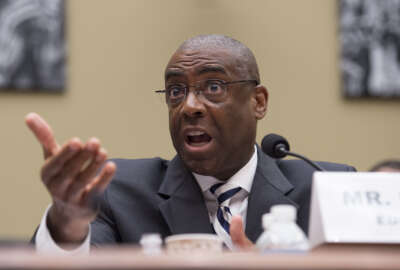
GSA promotes Ely, and the end of the ‘rock star’ CIO?
With several high profile CIO positions open, agencies need to consider what type of person they want to hire. A Brookings scholar is arguing against a high-profile...
The General Services Administration is looking for someone new to run one of its most important programs — the IT schedule.
But, for once, it’s not because someone left or retired. Rather, Mary Davie, the assistant commissioner of the Integrated Technology Services at the Federal Acquisition Service in GSA, promoted Kay Ely about a month ago to be the new deputy assistant commissioner of ITS.
“Kay’s leadership and focus on the acquisition community, driving efficiencies and savings for the federal government, and increasing innovation has taken Schedule 70 to new heights, and I’m excited for her to bring that energy and expertise to her new role,” Davie wrote in an email to staff.

Davie said Ely will continue to serve as acting director of schedule 70 until a new person is hired.
GSA posted the schedule 70 job March 3 and it remains open until March 31.
The position includes eight specific responsibilities, including planning, developing, implementing, directing and/or administering all contracting functions/acquisition programs for IT Schedules, as well as being responsible for policy implementation and management oversight of all IT Schedule programs.
Speaking of open positions, two cabinet level agencies are looking for chief information officers.
The departments of Education and Health and Human Services have posted job openings, and one is expected to come from the Office of Personnel Management shortly.
Which brings me to a recent blog post by Dr. Gregory Dawson, a senior faculty associate at the Center for Organization Research and Design (CORD) within the School of Public Programs at Arizona State University and an assistant professor at the W. P. Carey School of Business, on the Brookings website.
Dawson argues it’s time to “retire” the term “rock star CIO.” He defines a “rock star CIO” as someone coming from industry with a big reputation and even bigger ideas to change the agency, or the government. Dawson said Vivek Kundra, the first federal CIO during the Obama administration, was considered the first government “rock star” CIO.
Dawson wrote that the “myth of the rock star CIO does not align with the realities of the rock star CIO and, as a result, is an idea that must die. While undeniably, a government rock star CIO can be successful, success is far more likely if the CIO is a career government employee rather than a rock star.”
He said there are three reasons why the idea of a “rock star” CIO must go away. The most compelling of the three highlights the lack of understanding many do not have when they work for the government.
Therefore, Dawson said, the “rock star” either puts them at risk professionally or personally, or their big initiatives are stymied by career staff, Capitol Hill or agency leaders — likely a little bit from all three.
Instead, Dawson said agencies should hire career CIOs who know the system and how to work within it to make real and lasting change.
I disagree with Dawson.
I believe having a career executive who also is a “rock star” is attainable. There are several examples throughout government — David Bray, the Federal Communications Commission CIO; Mark Schwartz, the U.S. Citizenship and Immigration Service CIO; Terry Halvorsen, the Defense Department CIO; Dawn Leaf, the Labor Department CIO; and Joe Klimavicz, the Justice Department CIO. All are career employees who are making a real difference in their agency’s technology infrastructure.
Take Labor, for example. Leaf is dealing with a flat or shrinking budget, yet not only is she implementing real change, but doing so by taking advantage of shared services and other enterprise applications.
But finding the right executive isn’t easy, especially one that can bring a vision and can motivate agency IT and mission areas — many of which are frustrated by systemic challenges.
That doesn’t mean, however, that agencies shouldn’t look for a superstar. If a CIO is like a quarterback on a NFL team or point guard on a basketball team, it’s rare that any general manager says, our quarterback or point guard is good enough. They always are looking for a star.
Agencies also shouldn’t “settle” for anything less than a “rock star” as the benefits of finding one outweigh the negatives.
What do you think about the “rock star” CIO? Email me and I’ll post your comments — with or without your name — in my next Reporter’s Notebook.
Oh and by the way, the rumor mill is heating up that another change may be coming to the Education Department. Two sources say Steve Grewal, the acting CIO who replaced Danny Harris, who recently retired from Education, may be off to a new job. Sources say Grewal may be heading to a medium-sized agency to be a senior-level IT executive. If Grewal does indeed leave, it would mean Education would lose its top two IT executives in a matter of a few months, leaving many to wonder whether this is a house cleaning of sorts, or if they are getting out before things get worse.
Return to the Reporter’s Notebook
Copyright © 2025 Federal News Network. All rights reserved. This website is not intended for users located within the European Economic Area.
Jason Miller is executive editor of Federal News Network and directs news coverage on the people, policy and programs of the federal government.
Follow @jmillerWFED





